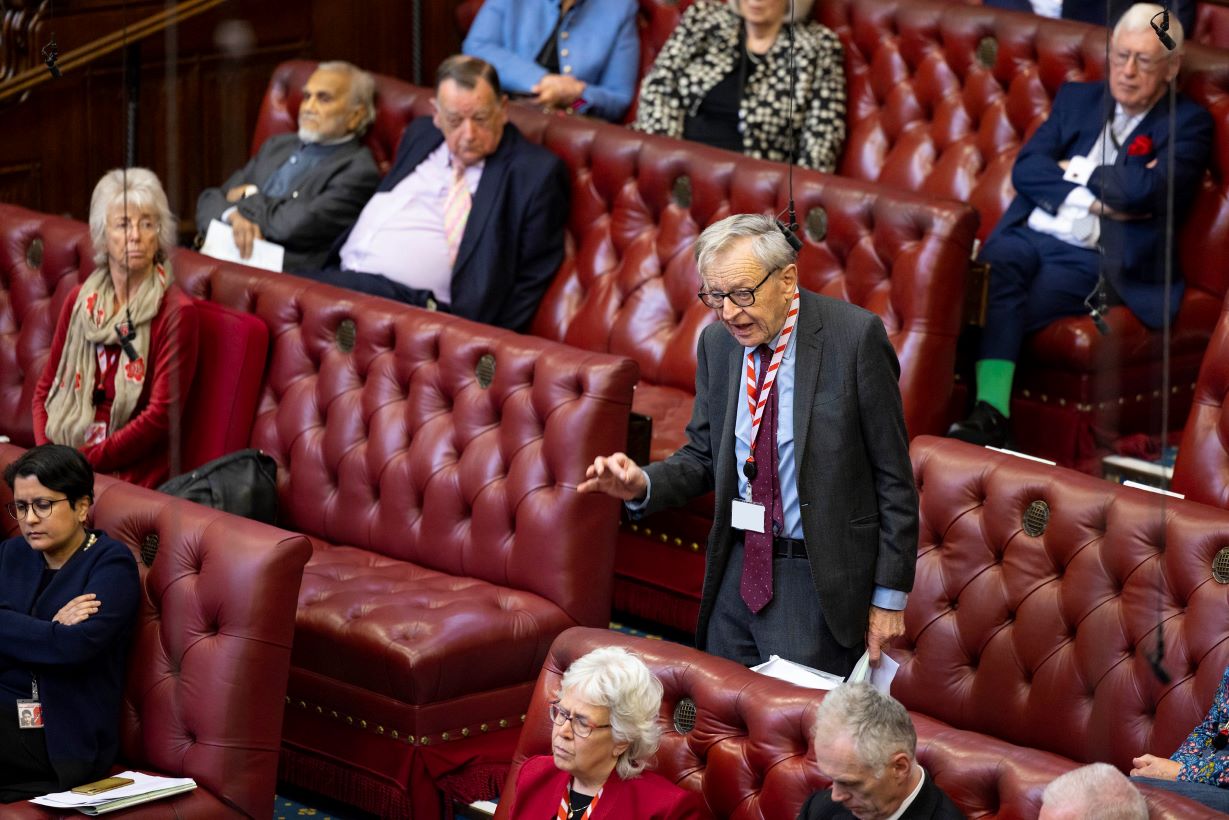UK Prime Minister Rishi Sunak’s Rwanda Bill passed the initial House of Commons hurdle with a majority of 44 last week, with further votes expected in the new year. The emergency legislation aims to revive the plan to send certain asylum seekers to Rwanda, a key priority for Sunak to deter Channel crossings. Sarah Singer explores the proposed legislation’s broader implications, highlighting its challenge to the role of UK Courts and its potential threat to the rule of law and separation of powers.
Last week, the UK House of Commons debated, and passed at its second reading, the Safety of Rwanda (Asylum and Immigration) Bill 2023. The proposed legislation is unprecedented. It explicitly acknowledges that the Home Secretary cannot confirm it is in accordance with the UK’s human rights obligations, and seeks to disapply certain sections of the UK’s Human Rights Act 1998 (which implements many of those obligations in domestic law). But the proposed legislation goes even further in directly challenging the role of the UK courts in a manner which is a dangerous affront to the rule of law and the separation of powers.
The Safety of Rwanda Bill
The substance of the Safety of Rwanda Bill claims the ”legal fiction” that Rwanda is a safe country to remove asylum seekers to, in direct contravention of the recent ruling of the UK Supreme Court in AAA v SSHD. In the AAA decision, the Supreme Court unanimously held that Rwanda was not a safe country to remove asylum seekers to, both due to the risk of harm such persons would face in Rwanda, and the risk that these people would be removed from Rwanda to their home country where they would face harm. Following this decision, the UK government swiftly drafted a new treaty with Rwanda which sought to address many of these concerns by strengthening Rwanda’s obligations regarding the treatment of persons removed there and enhancing the monitoring mechanisms that would oversee their transfer and stay.
The Supreme Court unanimously held that Rwanda was not a safe country to remove asylum seekers to.
This treaty is referenced in the Safety of Rwanda (Asylum and Immigration) Bill 2023, which declares in section 1 that “this Act gives effect to the judgement of Parliament that the Republic of Rwanda is a safe country”. This determination of safety is questionable given the Supreme Court pronounced that “significant changes” need to be made to Rwanda’s procedures and culture before it could be considered a safe destination to remove asylum seekers to. If Rwanda is indeed “safe” one could question the need for this legislation at all. The Bill is extreme in directly challenging a very clear ruling of fact from the highest court in the UK (as opposed to an interpretation of domestic law), effectively usurping the judicial role in this respect. As explained by the Bingham Centre, “What [the government] cannot do, however, compatibly with the UK’s well established understanding of the separation of powers, is to turn the factual question of Rwanda’s safety into a matter for the legislature to conclusively determine, rather than for the courts to consider in any future challenges to the application of the policy.”
The Bill is extreme in directly challenging a very clear ruling of fact from the highest court in the UK (as opposed to an interpretation of domestic law), effectively usurping the judicial role in this respect.
Constraining UK Courts
The remainder of the Safety of Rwanda Bill 2023 effectively limits or removes completely the ability of UK courts to review decisions to remove people to Rwanda. Under section 3, the courts are prohibited from any consideration that Rwanda is unsafe because it does not have effective processes in place or will not act in accordance with the new UK-Rwanda treaty. An extremely limited scope of review is available under section 4 where there is “compelling evidence” that the individual circumstances of a person mean there is a real risk of harm in Rwanda. But this must relate to risk of ill-treatment in Rwanda, not a conclusion that Rwanda is unsafe in general, nor that there is a risk the person would be removed from Rwanda to a third state or their country of origin. This very limited exception to the prohibition on judicial scrutiny was apparently only included at the insistence of Rwandan authorities, and in any case does not apply to anyone who falls under the Illegal Migration Act 2023. This means that anyone who has or will arrive irregularly to the UK after 20 July 2023 is subject to a blanket prohibition on any judicial decision that prevents or delays their removal from the UK.
The intention is to limit almost completely the ability of the UK courts to scrutinise government removal decisions. That the bill seeks to prohibit domestic judicial scrutiny of government action in this way is an affront to the rule of law and the UK’s separation of powers. As noted by the Law Society, “Independent judicial oversight is a bedrock of the rule of law and essential to ensuring there are democratic safeguards for individual rights. The measures taken in this bill would effectively place government above the law and demonstrate a profound lack of respect for the rule of law and separation of powers.” Judicial scrutiny of government action is a necessary precondition of a well-functioning democratic society to ensure the government is acting in line with the law (and not beyond it), and to avoid absolute power residing in one person or body, effectively operating as a “check and balance” on unfettered government action.
Legal challenge likely
The autonomy of UK courts is limited even further, however, in section 5 of the Bill, which prohibits UK courts from having regard to any interim measure from the European Court of Human Rights which requires a pause on removal of a person to Rwanda. That power is held by a Minister of the Crown only, who may “decide” whether or not to comply with such an interim measure. Perhaps in recognition of the legal dubiousness of this legislation, this section is startling in that it anticipates a challenge before the European Court of Human Rights and pre-emptively removes the judicial power to enforce interim measures from the European Court. Of course, although this bill seeks to disapply certain human rights obligations in domestic proceedings, it does not change the fact that the UK still has these obligations as a matter of international law.
Although this bill seeks to disapply certain human rights obligations in domestic proceedings, it does not change the fact that the UK still has these obligations as a matter of international law.
Given the almost complete frustration of domestic remedies in this bill, challenge before the European Court of Human Rights is almost inevitable. Essentially, what this legislation would do, if passed, is leave the European Court to scrutinise these processes rather than our own domestic courts in the UK. The UK government’s actions in seeking to force the removal of asylum seekers to Rwanda when there is a real risk they will be exposed to harm in Rwanda or further afield, following the clear determination of the Supreme Court, is devastating for those seeking safety in the UK. The Bill has been met by outrage amongst the community of refugee practitioners and advocates, but the concerns about this government legislation range far beyond the issue of asylum.
The government’s actions in this Bill are a clear affront to the rule of law and the UK’s separation of powers, which exist to ensure there are checks and balances on unfettered action by the executive. In the UK, we do not have a written constitution which defines the limits of governmental power. We rely instead on conventions and processes to avoid absolute power residing in one person or body. Seeking to limit the legitimate role of the courts is a strategy associated with authoritarian governments. Last year we saw mass protests in Israel following attempts to limit the power of the Israeli Supreme Court.
Seeking to limit the legitimate role of the courts is a strategy associated with authoritarian governments.
It is not clear what will happen next for the Safety of Rwanda Bill. Much will depend on the amendments proposed following further scrutiny in the House of Commons and the House of Lords in January. Although the Bill passed its second reading, there are suggestions that hard-line Conservative peers will vote against the legislation in its third reading if it is not tightened further. Conversely, centrist MPs have warned they would not be able to support a toughened-up version. Whatever the outcome, I suggest we should all be worried by this attempted power grab by an increasingly populist government. If government action remains unchecked, one should ask, paraphrasing Martin Niemöller, “First they came for the asylum seekers, who will they come for next?”
An earlier version of this piece was published in the RLI blog on Refugee Protection and Forced Migration.
All articles posted on this blog give the views of the author(s), and not the position of LSE British Politics and Policy, nor of the London School of Economics and Political Science.
Image credit: UK Home Office Flickr, CC BY-NC-ND 2.0 Deed | Attribution-NonCommercial-NoDerivs 2.0 Generic | Creative Commons







